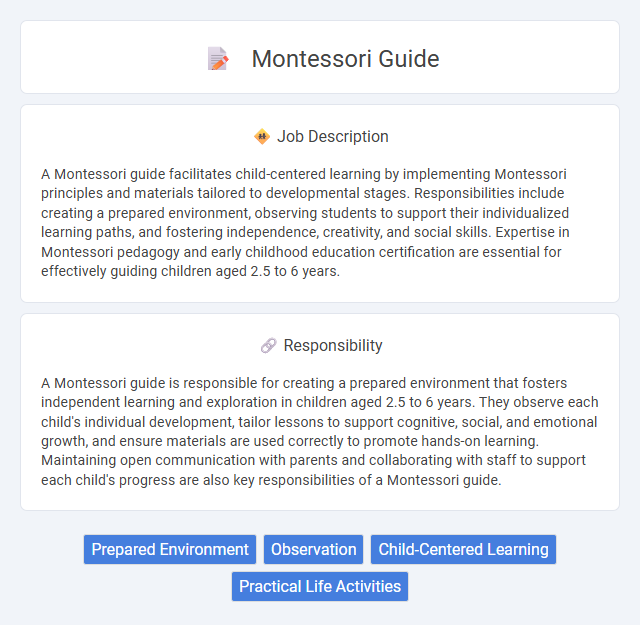
A Montessori guide facilitates child-centered learning by implementing Montessori principles and materials tailored to developmental stages. Responsibilities include creating a prepared environment, observing students to support their individualized learning paths, and fostering independence, creativity, and social skills. Expertise in Montessori pedagogy and early childhood education certification are essential for effectively guiding children aged 2.5 to 6 years.
Individuals with strong patience, empathy, and a passion for child development are likely suitable for a Montessori guide position. Those who thrive in structured yet flexible environments that require attentiveness to each child's unique learning pace may find this role fitting. Conversely, people uncomfortable with autonomous teaching methods or lacking interpersonal skills might face challenges in this job.
Qualification
Montessori guide positions require a deep understanding of Montessori philosophy and methods, typically supported by certification from an accredited Montessori training program. Candidates should possess strong skills in child development, classroom management, and individualized lesson planning to foster independent learning. Experience working with children aged 2 to 6 and excellent communication abilities are essential for effectively engaging students and collaborating with parents.
Responsibility
A Montessori guide is responsible for creating a prepared environment that fosters independent learning and exploration in children aged 2.5 to 6 years. They observe each child's individual development, tailor lessons to support cognitive, social, and emotional growth, and ensure materials are used correctly to promote hands-on learning. Maintaining open communication with parents and collaborating with staff to support each child's progress are also key responsibilities of a Montessori guide.
Benefit
Montessori guide roles likely offer significant benefits including fostering child development and promoting individualized learning experiences. They probably provide opportunities for professional growth and skill enhancement in early childhood education. The job may also support flexible working conditions and a collaborative environment that values creativity and patience.
Challenge
Working as a Montessori guide likely involves navigating complex challenges that require patience and adaptability. The role probably demands a deep understanding of individualized learning approaches while managing diverse student needs and behaviors. Success in this position may depend on one's ability to creatively solve problems within a structured educational framework.
Career Advancement
Montessori guide roles offer progressive career advancement through specialized certifications and leadership opportunities in educational settings. Experienced guides can transition into positions such as lead instructor, curriculum developer, or administrative roles within Montessori schools. Continuous professional development and mastery of Montessori pedagogy significantly enhance prospects for career growth and higher compensation.
Key Terms
Prepared Environment
Montessori guides play a crucial role in creating and maintaining the prepared environment, ensuring it is orderly, accessible, and tailored to the developmental needs of each child. They carefully select and arrange Montessori materials that promote independence, exploration, and hands-on learning, fostering a sense of curiosity and self-discipline. This prepared environment supports individualized education and encourages children to engage deeply with their learning processes within a structured yet flexible classroom setting.
Observation
Montessori guides excel in meticulous observation to tailor individualized learning experiences for each child, enhancing cognitive and social development. They systematically record and analyze student progress, identifying strengths and areas for growth to adjust teaching methods effectively. This focused observation fosters a supportive environment that encourages self-directed learning and holistic education.
Child-Centered Learning
A Montessori guide facilitates child-centered learning by observing and understanding each child's individual needs, interests, and developmental pace to create a supportive and engaging environment. They implement hands-on materials and activities designed to foster independence, critical thinking, and self-motivation in children. This role requires expertise in Montessori pedagogy to encourage exploration and holistic growth within a structured yet flexible classroom setting.
Practical Life Activities
Montessori guides specializing in Practical Life Activities facilitate children's development of fine motor skills, independence, and concentration through hands-on tasks such as pouring, buttoning, and cleaning. These guides create an environment that encourages purposeful movement and cultivates responsibility, promoting self-discipline and coordination. Mastery in observing and tailoring activities to each child's individual pace ensures effective learning rooted in real-life experiences.
 kuljobs.com
kuljobs.com